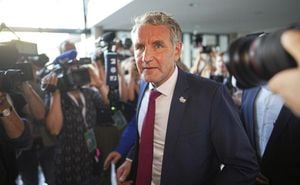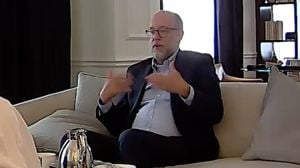Ontario is gearing up for what could be a dramatic snap election as Premier Doug Ford’s government anticipates economic uncertainty stemming from potential U.S. tariffs. The Toronto Star reported on Tuesday, January 23, 2024, on Ford's plans to potentially initiate the election process as early as February 27 or March 6.
This development follows remarks made by U.S. President Donald Trump earlier this week, indicating he may impose 25 percent tariffs on imports from Canada and Mexico. Ford has emphasized the importance of obtaining a clear mandate from Ontarians to manage the expected financial repercussions of such tariffs, remarking, "That's what's great about democracy — they either vote a government in, or they vote them out." With potential stimulus spending reaching tens of billions of dollars, many observers are asking how the Ford government intends to navigate this turbulent fiscal environment.
Political analysts suggest this is a strategic moment for Ford to secure his position. Peter Graefe, associate professor of political science at McMaster University, notes, “The strong performance in recent opinion polls, coupled with the division of the opposition vote between the NDP and the Liberals, make this a favorable time to face the electorate.”
The election's formal process begins when Ford advises Lieutenant Governor Edith Dumont to dissolve the provincial parliament. Upon dissolution, writs are drawn up for the 124 electoral districts within Ontario, marking the beginning of the election campaign. Interestingly, the Ontario Election Act mandates such writs be dated on Wednesdays and establishes the polling day as the fifth Thursday following the writ’s issuance.
Ford's potential election dates coincide with the increasing tension surrounding federal trade relations with the U.S. He insists Ontario requires a strong presence to advocate against tariffs effectively, highlighting the need for unity and strength within the provincial government. Ford stated at a recent fundraiser, "We really need a very strong mandate, probably the strongest we’ve ever had... it sends a clear message." He views the upcoming election as key to reinforcing Ontario’s position amid these challenges.
Opposition parties, including the New Democratic Party (NDP) and the Liberals, have criticized Ford’s motivations for calling what some see as an unnecessary election. NDP Leader Marit Stiles remarked, “This does pour cold water on Mr. Ford’s argument...” emphasizing the absence of necessity for the electorate to be called back to the polls. Stiles argues voters may be more concerned about pressing issues such as healthcare and housing costs rather than tariffs.
Meanwhile, Ford continues to push the narrative of urgency, stating, “Trust me, in politics, you have to have the mandate from the people.” Amidst these tensions, there has been increased discourse about the specific plans Ford may propose as part of his stimulus package, which he suggests may include spending levels not seen since the COVID-19 pandemic. Finance Minister Peter Bethlenfalvy offered little detail, stating, “It’s too early to go” on specifics, but maintaining the government is exploring all options.
The political climate is charged with both anticipation and skepticism as the major parties circulate potential campaign strategies. Ford's Progressive Conservatives had raised over $10.6 million last year, positioning themselves strategically for the expected election fight. The NDP and the Liberals also have significant war chests, indicative of the high stakes in this political arena.
Critics of Ford's actions, including Green Party Leader Mike Schreiner, are adamant about the need for transparency, urging the government to reveal the specifics of its spending plans if it intends to seek voter approval through a snap election. Schreiner challenged Ford’s history of not presenting detailed platforms during election runs, emphasizing, "If the premier is going to put us to vote, he should have a detailed plan for what he’s asking to have approved."
The looming decision over Ontario’s future has begun to stir the electorate, who now must grapple with questions about the political direction of their province amid external economic pressures. Ontario voters will likely find themselves considering not just the threats posed by U.S. tariffs but also the state of their healthcare system and the affordability crisis impacting their daily lives. The upcoming election promises to be pivotal.



